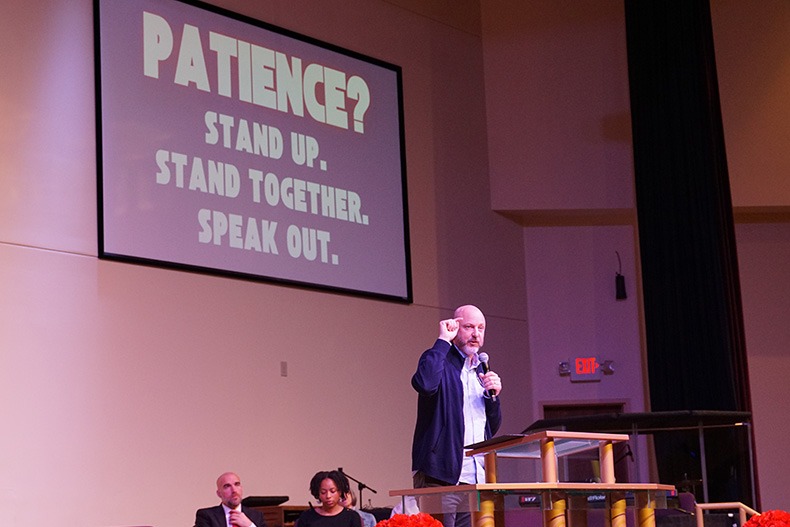By Andrew Gaug, Johnson County Post
For years, Johnson County has held out an affordable housing trust fund as one of its major goals for addressing homelessness and housing insecurity.
But a rift is growing between, on one hand, housing advocates who accuse the county of dragging its feet on establishing such a fund, and county officials who say they are already doing all they can to address growing rates of homelessness.
Frustrations came to a head last week at an event hosted by the Good Faith Network across the county line in Kansas City, Kansas.
At the event at Mt. Carmel Church of God In Christ, leaders of the organization, which is made up of almost 30 different local faith communities in Johnson County, made a plea for the Johnson County Board of County Commissioners to release an affordable housing trust fund study it approved more than a year ago.
The critiques, at times, became personal with the Rev. Tim Suttle, a founder of the Good Faith Network and pastor at Restoration Church in Olathe, directly calling out county chair Mike Kelly for not attending the event.
“This is a crisis, and our state is showing up, our service providers are showing up, the faith community is showing up. Where is my county?” he said.
In an email, Kelly said that the commissioners never ordered county staff to create an Affordable Housing Trust Fund Study. Instead, they asked for information about possible funding sources for all housing solutions.
“(The information) was sent to Good Faith Network leadership over a year ago … Thus, I’m unaware what study Good Faith Network leaders are seeking,” he stated in an email.
Along with that, Kelly and other members of the county commission say they are already doing all they can to address homelessness and housing affordability.
They point to last year’s prominent fight to establish Johnson County’s first countywide homeless shelter, which ultimately failed when the Lenexa City Council rejected a special use permit to convert a hotel for that purpose.
The commission reallocated some $6 million in federal funds originally slated to purchase and repurpose that hotel for other housing-related causes.
Commissioners also say the fund study that the Good Faith Network is calling to be released has been paused as the board looks into the possibility of joining a broader regional housing fund led by the Mid-America Regional Council and the Local Initiative Support Fund.
Commissioner Janeé Hanzlick said the current commission has done more to address housing issues than at “any other time in the county’s history.”
“It’s disappointing and counterproductive when a group that has the ability to collaborate and help in these initiatives, spends its energy and resources questioning this board’s commitment to addressing housing issues,” she said.
What is an affordable housing trust fund?
An affordable housing trust fund would be an ongoing source of dedicated public funding that supports the creation and preservation of attainable housing.
Cities like Kansas City, Mo., Lawrence and Topeka already have such housing trust funds.
Funding them can come from different sources. Kansas City, for instance, used federal COVID-19 relief money to jumpstart that city’s fund in 2021. Then, voters approved a $50 million bond in November 2021 to continue to fund it.
In the county commission’s priorities list released last summer, the county says a regional fund would not be funded with local government dollars but rather with a “mixture of debt, philanthropic investment and commercial investment.”
Johnson County recently allocated $6 million of its own federal COVID-19 relief dollars to go towards various efforts to address housing affordability and homelessness, but a housing trust fund would be a permanent source of money for such initiatives, both officials and advocates say.
Knowing the county had that backstop from a trust fund, developers would be enticed to come to the area to build affordable housing, Suttle said.
“If municipalities are giving support, they can do it and they’ll come in. Developers who want to do this will come in and do it,” Suttle said. “So, in order for that to be sustainable over time, you need permanent sources of funding, not just like COVID dollars or a one-time thing because then it’s just gone and the impact is minimal.”
Hanzlick said a housing fund for Johnson County is still on the table with the county looking at the broader regional effort backed by MARC.
“We’re looking to see what that is going to look like, and where we might, as a county, fit in with that initiative,” she said.
‘Why are they backing away from it?’
That’s not good enough for Suttle.
He said the commission is dragging its feet and ignoring one of the goals it set in the Housing for All Toolkit, created in 2021 by The United Community Services of Johnson County, in partnership with Johnson County.
“The Affordable Housing Trust Fund was recommended by the Johnson County Housing study clear back in 2020. An Affordable Housing Trust Fund is part of the Johnson County tool kit that’s online that came out of that study. It’s recommended by the Board of County Commissioner’s housing subcommittee. So why are they backing away from it?” Suttle told the Johnson County Post.
At the Good Faith Network’s event last week in Kansas City, Kan., several Wyandotte County commissioners pledged to support an affordable housing fund in their county.
Following that pledge, Suttle took to the mic lamenting Johnson County Chairman Mike Kelly’s absence from the gathering.
Kelly has attended gatherings of the Good Faith Network in past years, and Suttle said he was hoping to hear more about the county’s efforts towards increasing affordable housing and ending homelessness.
“He chose not to be here and that speaks volumes,” Suttle said at the event last Friday. “Showing up to talk with us about dismantling the legacy of redlining and ending homelessness and creating affordable housing was not his priority.”
Kelly explained his absence in an email response to questions to the Post.
“Unfortunately, this mid-day rally during the work week did not fit with my calendar,” he wrote. “I am lucky to receive invitations to many events, and unfortunately, I do not have the bandwidth to attend each and every one of them.”
In his remarks, Suttle said the county’s communication with the Good Faith Network often comes down to officials telling the group to “be patient.”
“Anything spent on affordable housing in Johnson County is a good thing, but the COVID money is all but gone. Where’s the permanent investment in affordable housing? And when we ask our leaders, they tell us to be patient,” he said to the audience.
Commissioners push back
For his part, Kelly said the county commission is still committed to ending homelessness in Johnson County.
“Johnson County and our partners have made significant strides towards more housing solutions across the housing continuum,” he wrote in his email to the Post. “I’m proud of the units we’ve built and the families we’ve supported in cooperation with organizations like Habitat for Humanity, Friends of Johnson County Developmental Supports, and the Salvation Army.”
Hanzlick, who is also a co-chair of the Greater Kansas City Regional Housing Partnership, pointed out to the commission’s efforts last year to purchase a La Quinta Inn hotel in Lenexa to turn it into a homeless services center.
That initiative ultimately failed when the Lenexa City Council denied a special use permit required for the project to move forward.
The county was set to use the $6 million in COVID-19 relief funds to close on purchasing the hotel but had to quickly reroute the money at the end of last year after the Lenexa vote scuttling the shelter project.
In a follow-up email to the Johnson County Post, Kelly clarified that the board is doing what they can to address homelessness and that the call-out was disappointing.
“The rhetoric is disappointing,” he said. “For me, it is more important that we focus on the work of bringing real solutions to the housing crisis to fruition – not picking fights over formatting data for publicity’s sake.”
Hanzlick agree and insisted the commission is doing what it can to address homelessness.
“We’ve returned millions of dollars to the community to help develop affordable housing, as well as put our political lives on the line, in what I would call an unprecedented attempt to establish a homeless services center,” she said.
Where does the effort go from here?
In his email to the Post, Kelly wrote that an affordable housing fund is “a tool, not a silver bullet” in addressing homelessness and more work needs to be done.
“Innovations are needed in multiple dimensions: how we utilize land, build homes, secure capital, regulate and deliver workforce housing,” he stated
To do that, multiple organizations and experts need to work together to find solutions to address homelessness.
“We need a holistic approach to solving the housing crisis,” he wrote. “In partnership with experts in the field and trusted institutions with a track record of success serving our residents every day, we can comprehensively identify Johnson County-specific innovations across multiple dimensions and figure out how best to scale them in a Johnson County-specific way.”
The Good Faith Network sees an affordable housing trust fund as a way to address homelessness now, as the number of those experiencing homelessness continues to grow in Johnson County.
In the minds of people like Tim Suttle, the time for waiting is over.
“How do they know there’s not a funding source? They didn’t do the study. They didn’t do the work. It’s like circular reasoning,” he said.
Another call at Thursday’s commission meeting
On Thursday, the Good Faith Network sent out an email to those on its mailing list, asking the Board of County Commissioners to release the affordable housing trust fund report.
In addition, Ros Thorpe, co-chair at the Good Faith Network, spoke during the public comment section of the commission’s regular weekly meeting Thursday morning.
“Its timely release is essential for informed decision-making on housing policy,” she said to the county commission. “Given the urgency of housing affordability issues in Johnson County, it is imperative that the public have access to this crucial information without further delay.”
Kelly said he still looks forward to working with the Good Faith Network to continue to fight homelessness.
“Advocates like the Good Faith Network will have their role to play,” he said. “Thus, we invite all sectors — private, public, philanthropic, and faith-based — to join in this community-wide effort to ensure that everyone in Johnson County has a safe place to live.”
View the original story here.






